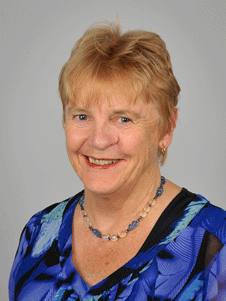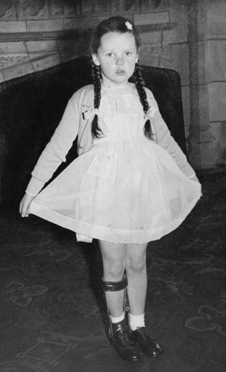Wednesday 25 September 2019 10:21pm

Anne Fitzpatrick.
When Anne Fitzpatrick, an assistant research fellow at the University of Otago, Wellington, got the chance to give a personal account of surviving polio to the readers of the New Zealand Medical Journal’s online Digest, she leapt at the opportunity to tell her story.
Anne has been a driving force behind the organisation of a symposium about the Late Effects of Polio (also known as Post-Polio Syndrome) to be held in Wellington next month. She is passionate about educating health professionals about the poorly understood condition, which is causing fresh symptoms in those who had polio as children.
In her personal account in the NZMJDigest she writes that she was 18-months-old and living with her family in Methven, in rural Canterbury when she was diagnosed with polio.
“My parents noticed I was having difficulty learning to walk. They took me to doctors who found that I was unable to lift my right foot and didn’t have the normal nerve reaction when they ‘hammered’ my knee.”
The doctors concluded Anne had contracted polio despite not having any of the usual symptoms, like fever.
When she was four, the family moved to Dunedin so Anne could gain better access to medical care. Her father started work as Postmaster at St Kilda Post Office, while Anne began physiotherapy at the Medical School.
She was also fitted with a calliper below the knee on her right leg.

Anne Fitzpatrick as an aspiring young dancer.
“A lady from CCS Disability Action used to pick me up and take me to physio several times a week. At hospital appointments, I remember ‘grumpy old doctors’, always white and male, demonstrating my leg to medical students without so much as a ‘hello’ to this self-conscious young girl.”
Refusing to let the polio hold her back, Anne launched herself into competitive swimming, diving, netball and tennis, achieving her bar to bronze medallion for life saving and once winning the under-15 Otago mixed doubles in tennis.
“It was a great day for me when I was told that I didn’t need to wear the calliper any longer.”
After leaving school, Anne began studying at the University of Otago, with an eye on becoming a doctor. Although she was offered a coveted place in the 1976 medical school intake, she decided instead to move to Australia where she did a degree in maths and statistics and later her Master’s.
She spent 13 years in Sydney, moving back to New Zealand after she met her husband, with a baby in tow and another on the way.
In her matter of fact manner, Anne says her foot continued to cause “a few hassles”. In her early twenties, she had triple fusion surgery on her ankle to help her walk.
“By the time I got to my early fifties, I was unable to walk due to osteoarthritis in my ankle, and I had a debridement to remove some bone in my ankle so that it was no longer ‘bone on bone’. Again my walking improved, but now my foot drop was becoming much worse and I was fitted with an ankle-foot orthosis.”
"Polio New Zealand members report that the two biggest issues they face are orthotics - and their health professionals not knowing about the Late Effects of Polio."
Once she reached her sixties, Anne says her foot began falling outwards, causing a lot of pressure, and resulting in a build-up of hard skin on her outer sole.
“The arthritis in my ankle constrains my walking, so I can now only walk for about five minutes.
“Like many other polio survivors, fatigue sets in hard and fast.”
It wasn’t until Anne joined Polio New Zealand that she realised she was probably experiencing the Later Effects of Polio, also known as Post-Polio Syndrome (PPS).
Now on the board of Polio New Zealand, Anne has been working tirelessly to educate as many people as she can about the condition.
“Polio New Zealand members report that the two biggest issues they face are orthotics - and their health professionals not knowing about the Late Effects of Polio,” she says.
Of the approximately 10,000 polio survivors in New Zealand, between 35 and 40 per cent are thought to experience Post-Polio Syndrome.
Anne Fitzpatrick first told her story in the September issue of the NZMJDigest.
The Late Effects of Polio Symposium is being held at the University of Otago, Wellington, on 18 October, in the lead up to World Polio Day on 24 October. The symposium will also be available as a webinar. For more information, or to register, visit www.otago.ac.nz/polio2019.
